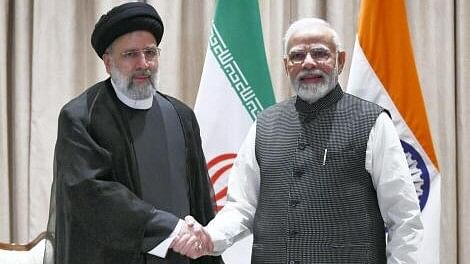
Prime Minister Narendra Modi and late President of Iran Ebrahim Raisi
Credit: PTI Photo
The helicopter crash that killed Iran’s President Ebrahim Raisi, 63, foreign minister Hossein Amir-Abdollahian, and seven others in the country’s East Azerbaijan province has come at a certain fraught moment for Iran, the region, and the world.
Raisi, a cleric and former head of the country's judiciary, was very close to Iran’s Supreme Leader Ayatollah Ali Khamenei, and his rise in power echelons in Iran since his foray into presidential elections in 2017 had been remarkably steady.
He fought and lost to moderate Hassan Rouhani, known for his role in negotiating the 2015 nuclear deal that limited Tehran’s foray into making nuclear weapons.
In 2019, Ayatollah Khamenei named him to the powerful position of head of the judiciary, and soon after he was elected deputy chairman of the Assembly of Experts, the 88-member clerical body responsible for electing the Supreme leader.
With the United States pulling out of the deal in 2018, further sanctions and bruising economic woes resulted in the hardliners’ sway and say going up in the scheme of things. Raisi’s election as president three years after defeating Rouhani was a crowning moment in the shift.
It could also be an irony of history or life itself that Raisi, who could have been in contention for becoming the Supreme Leader, was catapulted into a political journey that was cut short abruptly.
Foreign relations under Raisi
His tenure as president saw domestic protests in Iran over civil liberties and freedom rising in numbers. But Iran could stand to Western bullying and showed its deftness in manoeuvring the complex terrains of regional geopolitics.
Taking the West by surprise, in March 2023, the Raisi government agreed to a rapprochement with Saudi Arabia, seven years after they had severed diplomatic relations. As it sensed the shifting strands of international order pragmatically, Tehran cozied up even more with Moscow.
Under Raisi, India-Iran ties have shown steady promise and steadfastness marked the marquee Chabahar project that had slithered through the threats of US sanctions. Since both countries are bonded by mutual dependence and trust to work with each other, the bilateral ties are set to stay the course under any president.
While steadying the rocky ties with Pakistan, the Raisi administration did something no previous Iranian regime could do despite all their unbridled rhetorical fusillades: launching an attack inside the territory of Israel. It was done for the impact of intent, but tactfully handled Israeli retaliation without going for any further escalation.
Tehran knew fully well that the ongoing Hamas-Israel war changed the complexion of West Asian politics and diligent caution could save the day. On May 19, hours before his helicopter crashed in north-western Iran, Raisi declared that “Palestine is the first issue of the Muslim world.”
Iran’s next president
As the curtain comes down on the Raisi era, the focus will be on the impending presidential elections. In the event of the death of an incumbent president, Iran’s constitution mandates the first vice-president — in this case, Mohammad Mokhber — to run the government subject to approval from the Supreme Leader, also known as the Velayat-e Faqih in Shia Islamic theology.
Then the interim president would jointly with the heads of parliament and the judiciary oversee an election for a new president within the next 50 days.
Mokhber, 68, has the right credentials to throw the hat into the election ring. Serving as first vice-president since 2021, he is very close to the Supreme Leader, who had earlier served in the Islamic Revolutionary Guard Corps. Mokhber has been head of Setad, an investment fund linked to the Supreme Leader.
Given Iran’s complex political structure, it would be difficult to hazard a half-guess now on who would succeed Raisi after the next election. When Raisi was running in 2021, the turn-out in the polls was at a historic low, and many heavyweight conservative and moderate rivals were disqualified from contesting.
This time, it remains to be seen which way the wind will blow. Interestingly, there will also be questions on who would succeed the current Supreme Leader as Raisi was seen as a possible and worthy successor. Khamenei’s son Mojtaba is also seen as a top contender, though it must be seen how it would play out. This is because the leaders of the 1979 Islamic Revolution were vehemently opposed to successors being from within the same family.
(Jayanth Jacob, a foreign policy commentator, has covered the Ministry of External Affairs for over two decades. X: @jayanthjacob.)
Disclaimer: The views expressed above are the author's own. They do not necessarily reflect the views of DH.